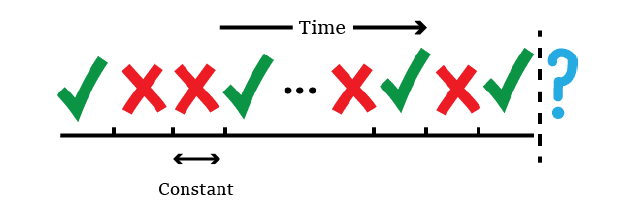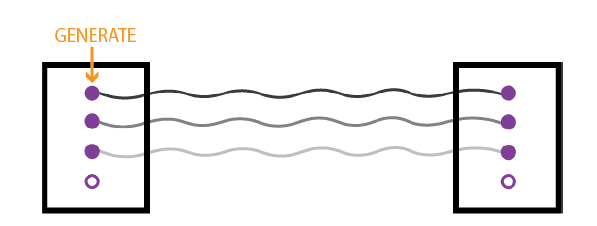21.11.2023Open Position MEP/BEP
Open positions for master thesis projects: Heuristic algorithm for improving resource generation in nearterm quantum networks

MEP opportunity in the group of Gayane Vardoyan.
Daily supervisor: Bethany Davies. For more information, email b.j.davies[at]tudelft.nl.
Entanglement is a uniquely quantum property that can theoretically enable applications that are
not feasible classically. The goal of a quantum network is to establish entanglement between remote
parties, so that they can carry out such applications. In this way, we view entanglement as a quantum
network resource. This project has the goal of improving quantum resource generation in near-term
quantum networks.
In practice, entanglement generation is performed with discrete attempts, as depicted in Figure 1.
This means that once an entangled link is in storage, it may by subject to decoherence (the quality
decreasing over time) while waiting for more links to be produced – see Figure 2 for an illustration of
this. It can therefore be challenging to establish several links with a high quality and close in time,
which may be a necessary requirement for an application. We have recently carried out an analysis
of such a process for the case when the trials are identical.

Figure 1: A sequence of discrete entanglement generation attempts.

Figure 2: Entangled links of varying quality, stored between two nodes. Links may decohere in memory while waiting for more to be produced.
With this project, you would extend on this previous work by considering the resource success probability to be an adjustable protocol parameter. We expect that an algorithm that updates this parameter dynamically will boost the achievable rate of a quantum protocol. The goal of this project is to design such an algorithm. Below are some possible avenues to explore.
• Investigation into how the network nodes should use their available local information (e.g. the
number of links in memory) to maximise the achievable rate of a protocol.
• Study of how the algorithm should change (or not) with the target protocol. For example, what
happens if you want to do quantum key distribution, instead of blind quantum computation?
• Comparison of how your algorithm performs to the case of identical trials. For example, this
could be done through simulation.
Desired prerequisites are introductory courses in quantum information and probability theory.
